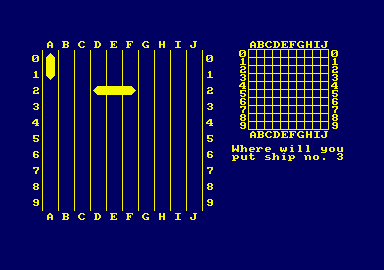This program was sent all the way from Australia and is a version of that old classic Battleships. It comes from Jason Hood from North Rockhampton, way Down Under. For those of you who aren't familiar with the game, here's a brief rundown. The computer displays two ten by ten grids, the larger is yours. You are asked to place four ships on this grid, inputting the x,y coordinates in reference to the grid. Once your ships are placed, you and the computer race to destroy each other's armoury. You do this by guessing where the computer has placed its (invisible) ships. When you find a ship the guesswork ends. You now have to sink it by hitting each section. It is a lot more difficult than it sounds - the computer is fairly good at figuring out where your ships are and takes some beating. This program gives good scope for real strategic thinking and will keep you engrossed for hours. 
AA | 
